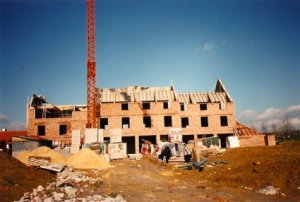Our story
HISTORICAL BACKGROUND
- In the early 1980s, a group of far-sighted people wondered how to valorize the presence in Louvain-la-Neuve of students originating from every corner of the world. They had the idea of accommodating Belgian and foreign students under the same roof. Conceptually, it would be a community-based establishment, a “Carrefour” (which means ‘crossroads’), where Belgians and foreigners could spend some of their time for knowing and appreciating each other, beyond their differences.
- (Original)Carrefour is an idea energized into being with a view to accommodating Belgian and foreign students under the same roof became a living and working reality in the early 1980s when a group of far-sighted people sought to call attention to the nucleus of overseas students studying in Louvain-la-Neuve. Conceptually, it would be a community-based establishment where Belgians and foreigners could interact on a regular basis. Likewise, it would be a prescription for transcending differences.
- The founding fathers of Carrefour drew their inspiration from an approach pioneered by Fr. Lebbe (cf. photo), a missionary in China in the early 20th century (1901-1940).

Vincent Lebbe, 1906 - The caption on the right-hand side of the photo is his name in Chinese “The thunder that sings in the distance”
- Vincent Lebbe’s life was spent striving to convince his contemporaries that European culture did not constitute the only frame of reference. It stood on a par with other cultures whose wealth was equally authentic and should be explored. His philosophy was expounded at a time when the Church’s attitude was still extremely paternalistic vis-à-vis “non-westerners”. Unlike most of his missionary colleagues, he sought to interact with the Chinese on a basis of equality as opposed to adopting an attitude keynoted on domination. There is no denying that few missionaries took an interest in Chinese as a language or bothered to learn it. Vincent Lebbe was one of the few who did so.
- In keeping with Fr. Lebbe’s rationale, young committed Christians decided to devote their energies to the Churches and populations in the third World. This paved the way for the formation of AFI “Auxiliaires Féminines Internationales” (International Women Auxiliaries) and currently called the “International Intercultural Federation” (Association Fraternelle Internationale). They discharged missionary assignments overseas, their aim being to become “Chinese with the Chinese” and “African with the Africans”. They focused on intercultural exchange while opening their minds and hearts to other cultures. They did shared their own, but did not impose it.
- (Today, AFI membership consists of couples and single people whose personal and professional lives are living testimonies to Vincent Lebbe’s philosophy in the 4 continents from which they have originated. AFI members have also been the driving force behind the first international student reception centres. Actually, a Carrefour was opened for Belgian and foreign students in Brussels in 1946.
- Forty years later, a small group from AFIS and AMIS launched the idea of opening a Carrefour in Louvain-la-Neuve, So, this was the move that led to the establishment of the non-profit-making “Carrefour Vincent Lebbe” there in 1986.
- The project was put to test in September of that same year, when the university let 30 rooms to Carrefour in the Grand Rue. The result showed that it had been unquestionably a step in the right direction, and this prompted the organizers to look for support externally, i.e. from professors, Christian institutions and private companies. Individuals from various walks of life made contributions too, i.a. in the form of capital, loans or gifts. It was an initiative for which Cardinal Danneels also pledged his backing.

The students’ hostel under construction
- Construction of the students’ hostel began in 1987. This was followed by building 23 one-roomed flats (studios) and apartments in 1989 to accommodate students at a more advanced stage of study and those already employed. The establishment of a second non-profit-making unit, i.e. the “Carrefour Vincent Lebbe Habitants” was thought advisable on the grounds that the buildings in question needed a management entity.
- Construction of the studios (i.e. study-bedrooms) and apartments was completed in 1993 and the first occupants took up residence.
- A 6-member Board of Directors on which volunteers hold office manages the 2 units. Representatives of students and residents serve on it too.
“Keep your mind young and thirsty for knowledge” 1926, Vincent Lebbe
